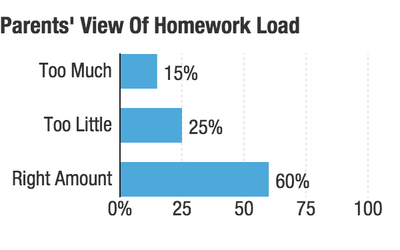Homework: A New User's Guide

If you made it past the headline, you're likely a student, concerned parent, teacher or, like me, a nerd nostalgist who enjoys basking in the distant glow of Homework Triumphs Past (second-grade report on Custer's Last Stand, nailed it!).
Whoever you are, you're surely hoping for some clarity in the loud, perennial debate over whether U.S. students are justifiably exhausted and nervous from too much homework — even though some international comparisons suggest they're sitting comfortably at the average.
Well, here goes. I've mapped out six, research-based polestars that should help guide you to some reasonable conclusions about homework.
How much homework do U.S. students get?
The best answer comes from something called the National Assessment of Educational Progress or NAEP. In 2012, students in three different age groups — 9, 13 and 17 — were asked, "How much time did you spend on homework yesterday?" The vast majority of 9-year-olds (79 percent) and 13-year-olds (65 percent) and still a majority of 17-year-olds (53 percent) all reported doing an hour or less of homework the day before.
Another study from the National Center for Education Statistics found that high school students who reported doing homework outside of school did, on average, about seven hours a week.
If you're hungry for more data on this — and some perspective — check out this exhaustive report put together last year by researcher Tom Loveless at the Brookings Institution.
An hour or less a day? But we hear so many horror stories! Why?
The fact is, some students do have a ton of homework. In high school we see a kind of student divergence — between those who choose or find themselves tracked into less-rigorous coursework and those who enroll in honors classes or multiple Advanced Placement courses. And the latter students are getting a lot of homework. In that 2012 NAEP survey, 13 percent of 17-year-olds reported doing more than two hours of homework the previous night. That's not a lot of students, but they're clearly doing a lot of work.

LA Johnson/NPR
That also tracks with a famous survey from 2007 — from MetLife — that asked parents what they think of their kids' homework load. Sixty percent said it was just right. Twenty-five percent said their kids are getting too little. Just 15 percent of parents said their kids have too much homework.
Research also suggests that the students doing the most work have something else in common: income. "I think that the debate over homework in some ways is a social class issue," says Janine Bempechat, professor of human development at Wheelock College. "There's no question that in affluent communities, children are really over-taxed, over-burdened with homework."
But the vast majority of students do not seem to have inordinate workloads. And the ones who do are generally volunteering for the tough stuff. That doesn't make it easier, but it does make it a choice.
Do we know how much homework students in other countries are doing?
Sort of. Caveats abound here. Education systems and perceptions of what is and isn't Homework: A New User's Guide : NPR Ed : NPR:
